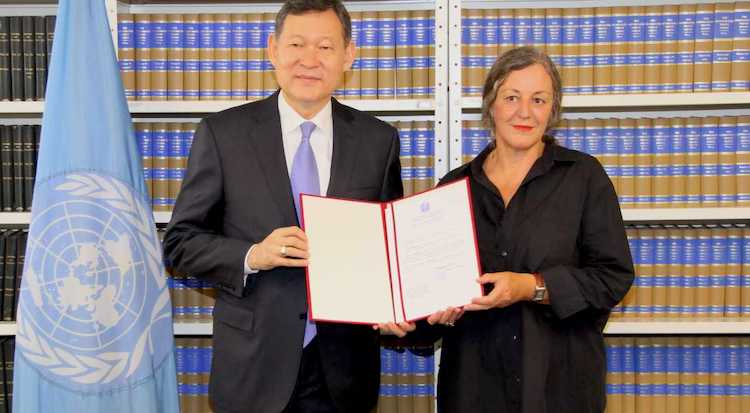By J Nastranis
NEW YORK (IDN) – Kazakhstan, the country where the Soviet atomic bomb was first tested exactly 70 years ago, has become the 26th State party by depositing with the United Nations Secretariat the ratification instrument to the Treaty on the Prohibition of Nuclear Weapons (TPNW) thus marking one step closer to the prospect of the entry into force of the landmark Treaty, which establishes a legal ban on nuclear weapons.
And this on August 29, the International Day against Nuclear Tests. This year, the UN officially commemorates the Tenth Anniversary of the Day.
On December 2, 2009, the 64th session of the United Nations General Assembly declared August 29 the International Day against Nuclear Tests by unanimously adopting resolution 64/35. The resolution calls for increasing awareness and education “about the effects of nuclear weapon test explosions or any other nuclear explosions and the need for their cessation as one of the means of achieving the goal of a nuclear-weapon-free world”.
The resolution was initiated by the Republic of Kazakhstan, together with a large number of sponsors and cosponsors with a view to commemorating the closure of the Semipalatinsk Nuclear Test site on August 29, 1991.
2010 marked the inaugural commemoration of the International Day against Nuclear Tests. In each subsequent year, the day has been observed by coordinating various activities throughout the world, such as symposia, conferences, exhibits, competitions, publications, lectures, media broadcasts and other initiatives.
Since its establishment, many bilateral and multilateral governmental level developments as well as broad movements in civil society have helped to advance the cause of banning nuclear tests.
Since nuclear weapons testing began on July 16, 1945, nearly 2,000 have taken place. In the early days of nuclear testing little consideration was given to its devastating effects on human life, let alone the dangers of nuclear fallout from atmospheric tests.
The event at the UN was attended by representatives of the United Nations and the international movement ICAN, a coalition of more than 500 non-governmental organizations from 103 countries committed to banning nuclear weapons. They thanked Kazakhstan for its strong commitment and leadership in nuclear disarmament.
Handing over the document to the depository, the Permanent Representative of Kazakhstan to the United Nations, Ambassador Kairat Umarov noted that this event was another important practical contribution of Kazakhstan to the global efforts to build a world free of nuclear weapons.
Kazakhstan had participated actively in the elaboration and adoption of the Treaty. Its main provisions are in line with the principled position of Kazakhstan, which has taken an ambitious path of becoming a leader in nuclear disarmament and non-proliferation after being a one-time holder of the world’s fourth nuclear arsenal.
Kazakhstan’s continued anti-nuclear efforts are guided by the fundamental initiative of the country’s First President Nursultan Nazarbayev, to achieve a nuclear-weapon-free world by 2045, the UN’s centenary. The adoption therefore of the Nuclear Ban Treaty is intended to be an important milestone in the history of the struggle to eliminate nuclear weapons, noted Ambassador Umarov
The Treaty will enter into force 90 days after the fiftieth instrument of ratification has ben deposited. Against this backdrop, Ambassador Umarov remarked at the ceremony of ratification: “rif Bolivia on 6th August, closed the first half of the necessary ratification, then Kazakhstan, on the occasion of the observance of the International Day against Nuclear Tests, opens the second half. This should inspire all those who care about the safe future of all humankind to take similar actions.”
Those gathered at the ceremony observed a one-minute silence in memory of and to honour the victims of nuclear tests. “Our action is also our tribute to all those who have suffered from the consequences of the use of nuclear weapons. Our common task is to prevent the recurrence of such tragedies,” underscored Kairat Umarov.
The Treaty on the Prohibition of Nuclear Weapons was adopted by the UN General Assembly on July 7, 2017 with the support of 122 UN Member States. It was the outcome of two sessions of the UN Conference to negotiate a legally binding instrument to prohibit nuclear weapons, that would lead towards their total elimination. The Conference took place in March and June-July 2017 in New York.
The deliberations were open to all UN Member States. However, nine de facto and de jure nuclear weapons possessing states and their allies boycotted these talks.
The TPNW was opened for signature on 20 September 2017 during the 72nd session of the UN General Assembly in New York. IDN-InDepthNews – 29 August 2019]
Photo: Kazakhstan officially hands over to UN document on ratification of the Treaty on the Prohibition of Nuclear Weapon. Credit: Ministry of Foreign Affairs of Kazakhstan.




